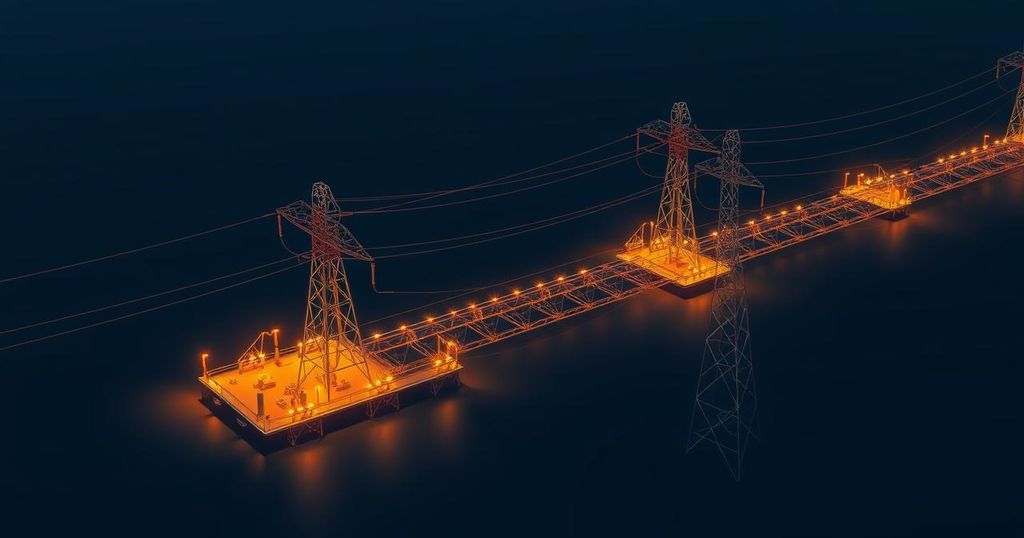Egypt and Saudi Arabia are strengthening energy ties with the upcoming first phase of their electricity interconnection project, operational by June 2025. This project supports 1,500 megawatts of capacity and will enhance bilateral energy exchange while coinciding with a summit aimed at improving intergovernmental coordination. Mutual investment agreements and regional security discussions were also key topics during the Cairo summit.
Egypt and Saudi Arabia have made significant strides in enhancing their energy collaboration with the announcement that the first phase of the Egyptian-Saudi electricity interconnection project is set to become operational by May or June 2025. During a weekly press conference, Prime Minister Mostafa Madbouly emphasized the project’s pivotal role in supporting renewable energy initiatives and the importance of joint industrial investments. The interconnection will initially boast a capacity of 1,500 megawatts, facilitating energy exchanges between the two nations, and will ultimately reach a total capacity of 3,000 megawatts, surpassing the energy capacity of Gulf Cooperation Council (GCC) countries. This announcement follows a recent summit held in Cairo between Egyptian President Abdel Fattah Al-Sisi and Saudi Crown Prince Mohammed bin Salman, aiming to strengthen bilateral coordination across various sectors, including politics and regional concerns. Prime Minister Madbouly expressed his approval of the newly established Egyptian-Saudi Supreme Coordination Council, which will serve as a vital platform for high-level collaboration between both governments. In the context of the summit, a mutual investment protection agreement was signed to promote and safeguard investments between the countries. Prime Minister Madbouly lauded the swift progress made in these agreements, which he views as essential for enhancing Saudi investments in Egypt. Further discussions during the summit tackled current regional issues, particularly the conflicts in Gaza and Southern Lebanon. Prime Minister Madbouly stated, “Both Egypt and Saudi Arabia share a unified vision regarding these crises, emphasizing the need for joint efforts to prevent the spread of conflict and facilitate peaceful resolutions.” He reaffirmed Egypt’s commitment to maintaining security and stability, declaring that military engagement would only be considered if the nation’s territorial integrity or vital interests were under direct threat. In addition to the electricity interconnection, Prime Minister Madbouly provided updates on Egypt’s economic initiatives, including the upcoming trial operation of the Grand Egyptian Museum, which he anticipates will greatly enhance Egypt’s global tourist appeal once fully operational. Madbouly concluded by urging citizens to remain vigilant and united amidst the current regional challenges, assuring them of Egypt’s steadfastness as a beacon of stability in the region.
The Egyptian-Saudi electricity interconnection project represents a significant infrastructural development intended to bolster energy collaboration between Egypt and Saudi Arabia. As part of broader diplomatic and economic initiatives, this project reflects both countries’ commitment to renewable energy and mutual investment strategies. The initiative is set in a geopolitical context marked by regional instability, highlighting the necessity for coordinated responses to crises affecting both nations and their interests. Furthermore, the establishment of the Supreme Coordination Council signifies a move towards more integrated governance and strategic partnership between the two countries.
In conclusion, the completion of the first phase of the Egyptian-Saudi electricity interconnection project, scheduled for operational status by May or June 2025, marks a pivotal development in energy cooperation between the two nations. The establishment of strategic councils and mutual protection agreements further solidifies bilateral relations, enabling both countries to tackle regional challenges collectively while enhancing their economic ties. This proactive approach underscores the importance of collaborative efforts in fostering stability and progress in a rapidly changing regional landscape.
Original Source: www.dailynewsegypt.com






